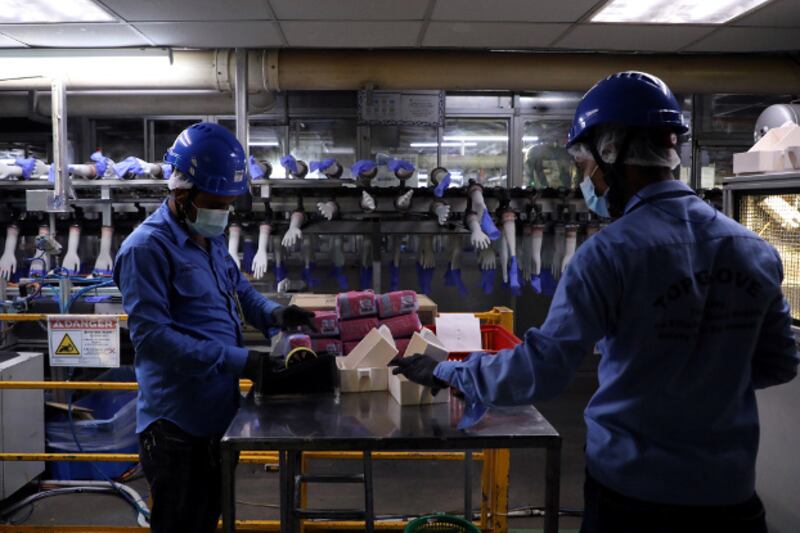Malaysia’s Top Glove can immediately resume disposable glove exports to the United States because it improved labor and living condition in its facilities more than a year after Washington banned its products over forced labor concerns, the U.S. customs agency said Thursday.
Top Glove’s improvements show that Washington’s efforts to end “modern slavery” work, said U.S. Homeland Security, the agency that oversees the Customs and Border Protection (CBP) division.
“Top Glove’s actions in response to the Withhold Release Order, which include issuing more than $30 million in remediation payments to workers and improving labor and living conditions at the company’s facilities, suggest that CBP’s enforcement efforts provide a strong economic incentive for entities to eliminate forced labor from their supply chains,” CBP Acting Commissioner Troy Miller said in a statement.
Homeland Security Secretary Alejandro N. Mayorkas said last year’s decision to halt imports of the gloves sent a strong message to the world.
“This is a great example of the extraordinary efforts of U.S. Customs and Border Protection to protect human rights and American consumers and businesses from goods made by modern slavery,” Mayorkas said in the same statement.
The Malaysian company responded on Thursday.
“Top Glove remains committed to the health, safety and well-being of its people. The company will continue to work hard and smart toward becoming an industry leader in this area and meeting the growing expectations of its stakeholders,” it said in a statement.
U.S. Customs blocked imports from Top Glove in July 2020 despite increasing COVID-19 infections, saying it had evidence of forced-labor indicators at the firm’s operations. The indicators included “debt bondage, excessive overtime, retention of identification documents and abusive working and living conditions.”
It issued the Withhold Release Order (WRO) against Top Glove Sdn Bhd and its subsidiary, TG Medical Sdn Bhd., causing the company to respond with a petition asking the order be modified.
“Since that time, Top Glove has provided additional information to CBP, which CBP believes establishes by satisfactory evidence that the subject disposable gloves are no longer mined, produced or manufactured in any part with forced labor,” the company said.
Top Glove had said last year in August that it began compensating migrant workers, paying out 4.4 million ringgit (U.S. $1 million).
Top Glove Corp. operates 41 plants in Malaysia, five in Thailand, and one each in China and Vietnam, the company statement said. It employs 22,000 people and supplies gloves to more than 2,000 customers in over 195 countries.
The company’s shares rose as much as 10 percent on Friday before closing less than 1 percent higher after falling up to 40 percent following the ban.

Employees work on a production line at the Top Glove factory in Shah Alam, Malaysia, Aug. 26, 2020. [Reuters]
Calls to review labor policy
Andy Hall, an international migrant worker rights specialist who lives in Nepal, welcomed the announcement. He had petitioned the U.S. to investigate Top Glove over forced labor allegations.
It is “important to acknowledge the positive effort of TG’s management, investors and buyers together to considerably improve work and living conditions for TG’s workers,” Hall said in a statement.
Still, he pointed out that there remain serious challenges to decent work and living conditions in the Malaysian gloves sector and much work is necessary to ensure decent working conditions and a living wage for all.
Prior to the announcement, former cabinet minister Abdul Wahid Omar urged the government to reform its foreign workers’ policy to deal with forced labor issues.
He said on Thursday that a policy review should be undertaken urgently to exclude from the supply chain companies that are accused of engaging in forced labor practices and modern slavery.
Abdul Wahid was in charge of the economic planning unit under then-Prime Minister Abdullah Ahmad Badawi in 2013 and now serves as chairman of Malaysia stock exchange.
“If this spreads to the electrical and electronic sector, the damage will be irreparable,” he said.
The U.S. State Department in July relegated Malaysia to the bottommost Tier 3 in its annual report assessing efforts by countries worldwide to combat human trafficking, because it did not meet minimum standards to eliminate trafficking and had not made significant efforts to do so.
“Unless addressed urgently, the WRO and the categorization of Malaysia as a Tier 3 country under the Trafficking in Persons report will cause untold damage to the Malaysian economy,” Abdul Wahid told participants in Thursday’s National Recovery Summit in Kuala Lumpur.
In response to the U.S. report, Human Resource Minister M. Saravanan had said the ministry was working with the International Labor Organization to formulate a national action plan on forced and child labor. The plan is expected to be finalized in the fourth quarter of 2021.
He said the ministry was reviewing existing memoranda of understanding with source countries to ensure workers are protected but employers are not burdened.
